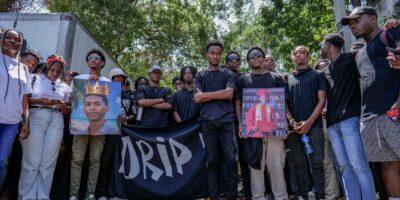The United States has raised concerns over alleged attempts at corruption aimed at destabilizing Haiti. In a statement published yesterday on X, the U.S. commended members of Haiti’s Transitional Presidential Council (CPT) who “refused to give in to corruption.” CPT President Fritz Alphonse Jean, however, rejected the message, calling it “disrespectful.”
Amid heightened tensions within the transitional government, U.S. officials say they have been informed of efforts to undermine stability through corrupt practices.
In the message posted on X, the Bureau of Western Hemisphere Affairs of the U.S. State Department praised CPT members “for rejecting corruption .”
The bureau also reaffirmed its support for cooperation between the CPT and the Prime Minister. It warned that anyone attempting to disrupt this collaboration would be held accountable.
No specifics were given about the alleged corruption attempts, nor were any council members named. The U.S. has been contacted for further details. This article will be updated if a response is received.
Fritz Alphonse Jean, the current head of the CPT, denied the corruption claims during an interview with AyiboPost yesterday afternoon.
“That’s not true. It’s a narrative pushed by people close to the current power,” said the economist.
Rumors have circulated suggesting a $3 million payout was offered to support an agreement to oust current Prime Minister Alix Didier Fils Aimé. Jean dismissed the claims, stating that no vote to replace the head of government had taken place.
Major decisions like the dismissal of the Prime Minister require four votes within the CPT.
The seven voting members of the Council are usually split into two main factions. The dominant bloc includes three advisers accused of corruption and seen as allies of the private sector representative, Laurent Saint Cyr. Saint Cyr is expected to replace Jean as Council President within a week.
“They’re accusing us of being for sale,” said Jean. “That’s completely disrespectful. It’s an insult to the CPT and to the country.”
A member of the Prime Minister’s cabinet, speaking to AyiboPost, interpreted the State Department’s message as a clear sign of support for Alix Didier Fils Aimé.
“The foreigner has spoken, and it’s sad that it takes that to move things here,” he said, referring to alleged unrest expected this weekend .
In 2021, the U.S., alongside other embassies and institutions, had already intervened to settle a leadership dispute in favor of Ariel Henry over former Prime Minister Claude Joseph.
Observers see the recent statement as yet another example of foreign interference.
“It’s a reminder that, despite changes in Washington, political interventionism remains a hallmark of U.S. policy in Haiti,” said Jake Johnston, a researcher at the Center for Economic and Policy Research.
“The U.S. is once again taking sides in an internal conflict,” he added. “What makes it worse is that the entire transitional structure—put in place with strong U.S. backing last year—suffers from a deep lack of legitimacy and has no real popular support.”
Also read : CPS secures controversial contract for the public port of Port-au-Prince
More than four years after the assassination of President Jovenel Moïse, the political transition remains stalled.
Haiti currently has no elected officials, and half the population is in need of humanitarian aid.
Gangs control 90% of the capital. Their influence is spreading into provincial towns, and they have displaced a record 1.3 million people.
Despite some efforts, the transition has failed—just eight months before its expected end—to deliver concrete results on its two core missions: reducing insecurity and organizing elections.
This failure comes atop an already fragile political situation.
Part of the Council is entangled in a corruption scandal. Meanwhile, the looming concentration of the two top transitional roles—Council President and Prime Minister—under private sector control is causing unease.
“Private sector actors played a role in creating this chaos,” said Jean, referring to what he described as a mafia among investors.
According to the economist and author of Haiti: An Economy of Violence, members of the private sector are “involved in arms trafficking and money laundering. And when the private sector controls both branches of the executive,” he warned, “it raises legitimate concerns.”
Jean spoke to AyiboPost from northern Haiti, where he was inaugurating an elite public high school in Quartier-Morin alongside Council member Leslie Voltaire.
“We’re trying to address a historical issue in this country: the divide between Black and Mulatto ,” said Jean. “If both executive branches are led by people from one group, it will awaken hidden demons.”
The country risks plunging further into instability.
The private-sector-led leadership duo was not “planned,” according to a prominent business sector figure interviewed by AyiboPost. “In any case,” he added, “there’s no clear way out of the crisis. We need more open and inclusive dialogue to move toward legitimate, credible elections and a structured resolution.”
Fritz Jean assumed leadership of the CPT in February 2025, succeeding Leslie Voltaire through a rotational agreement.
During his five-month tenure, the CPT inaugurated a national call center to improve communication between the public administration and citizens, as well as at least one school.
However, only three cabinet meetings have taken place—two within the first three months.
On June 9, 2025, Jean explained the irregularity of these sessions, stating that cabinet meetings “shouldn’t just be about appointing incompetent directors. They must tackle the country’s structural issues.”
That same day, Council member Emmanuel Vertilaire posted on X, criticizing what he called an “unproductive ego that fractures unity” within the Council.
Vertilaire, who represents the Pitit Desalin party, has been named in a corruption scandal alongside former National Credit Bank president and fellow Council members Smith Augustin and Louis Gérald Gilles.
The incoming administration, dominated by the private sector, will face deep public skepticism.
“I had hoped this team in power would change things—especially when it comes to security. But so far, nothing,” said a farmer from Petite-Rivière de l’Artibonite, who was forced to abandon her home and land in April 2025 after gangs entered her town.
“I didn’t expect anything to begin with. And I still don’t,” added Josué Pierre Louis, a young law graduate living in Saint-Marc.
He pointed to the internal divisions within the CPT and the absence of any clear strategy to meet its goals.
“Without a collective vision,” he said, “expecting lasting results was always an illusion.”
Contacted by AyiboPost, the U.S. Embassy in Port-au-Prince did not provide any specific details about the corruption allegations, nor did it mention the names of any potentially implicated council members.
“The Haitian people have made it clear that the current transitional government must be just that – a ‘transition’ – and prioritize national security and governance, during their tenure on behalf of the Haitian people over competing individual interests,” a spokesperson said on August 5, 2025.
“The TPC was set up with different sectors represented and it has a rotational schedule that must be adhered to,” the spokesperson continued. “The United States welcomes positive and productive engagement of all sectors who promote stability, security, and an end to the senseless violence killing the Haitian people and destroying their future.”
By : Widlore Merancourt & Wethzer Piercin
The cover photo was taken by Valérie Baeriswyl at the AyiboPost office in February 2022.
► AyiboPost is dedicated to providing accurate information. If you notice any mistake or error, please inform us at the following address : hey@ayibopost.com
Stay in touch with AyiboPost via:
► Our channel Telegram : Click here
►Notre Channel WhatsApp : Click here
►Our Community WhatsApp : Click here







Comments